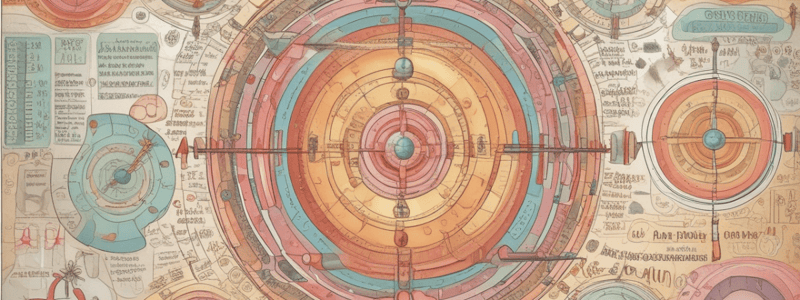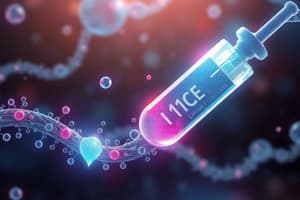Podcast
Questions and Answers
What is the primary cause of Type 1 Diabetes Mellitus?
What is the primary cause of Type 1 Diabetes Mellitus?
- Hormonal imbalance
- Pancreatic cell destruction (correct)
- Defect in insulin receptors
- Insulin resistance
What is the result of glucagon in excess in the body?
What is the result of glucagon in excess in the body?
- Decreased insulin secretion
- Reduced plasma glucose levels
- Increased entry of glucose into cells
- Increased glycogenolysis and gluconeogenesis (correct)
What is the purpose of testing for pre-diabetes and diabetes beginning at age 45?
What is the purpose of testing for pre-diabetes and diabetes beginning at age 45?
- To identify patients with a family history of diabetes
- To monitor insulin resistance
- To detect secondary causes of diabetes
- To diagnose diabetes at an early stage (correct)
What is the criterion for diagnosing diabetes using the HbA1c test?
What is the criterion for diagnosing diabetes using the HbA1c test?
What is a common symptom of diabetes in addition to the 3 Ps?
What is a common symptom of diabetes in addition to the 3 Ps?
What is the primary cause of gestational diabetes?
What is the primary cause of gestational diabetes?
What is the effect of somatostatin on endocrine hormones?
What is the effect of somatostatin on endocrine hormones?
What percentage of diabetes cases are Type 1 Diabetes Mellitus?
What percentage of diabetes cases are Type 1 Diabetes Mellitus?
What is the result of glucagon action on glucose metabolism?
What is the result of glucagon action on glucose metabolism?
What is the primary mechanism of Type 2 Diabetes Mellitus?
What is the primary mechanism of Type 2 Diabetes Mellitus?
What is the diagnostic criterion for diabetes using the FPG test?
What is the diagnostic criterion for diabetes using the FPG test?
What is the recommended frequency of testing for pre-diabetes and diabetes?
What is the recommended frequency of testing for pre-diabetes and diabetes?
What is the net effect of growth hormone on glucose levels in the blood?
What is the net effect of growth hormone on glucose levels in the blood?
What is the primary mechanism of action of somatostatin in glucose metabolism?
What is the primary mechanism of action of somatostatin in glucose metabolism?
What is the characteristic feature of Type 2 Diabetes Mellitus?
What is the characteristic feature of Type 2 Diabetes Mellitus?
What is the purpose of testing for pre-diabetes and diabetes using the OGTT test?
What is the purpose of testing for pre-diabetes and diabetes using the OGTT test?
What is the consequence of glucagon excess in the body?
What is the consequence of glucagon excess in the body?
What is the characteristic feature of gestational diabetes?
What is the characteristic feature of gestational diabetes?
What is the recommended test for diagnosing diabetes in patients with symptoms?
What is the recommended test for diagnosing diabetes in patients with symptoms?
What is the consequence of growth hormone action on glucose metabolism?
What is the consequence of growth hormone action on glucose metabolism?
What is the characteristic feature of hyperosmolar insulin-resistant states?
What is the characteristic feature of hyperosmolar insulin-resistant states?




